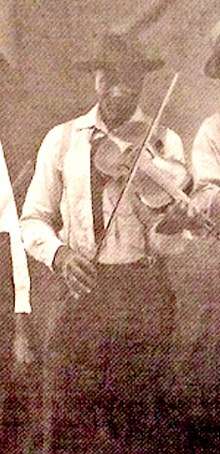Arnold Shultz
Arnold Shultz (1886–1931) was an American fiddler and guitarist who is noted as a major influence in the development of the "thumb-style," or "Travis picking" method of playing guitar.[1]

Biography
Shultz, the son of a former slave, was born into a family of touring musicians in Ohio County, Kentucky, in 1886.[2] In 1900, Shultz began studying guitar under his uncle, developing a jazzy "thumb-style" method of playing guitar that eventually evolved into the Kentucky style for which such musicians as Chet Atkins, Doc Watson and Merle Travis would be known.[2] Professionally, Shultz was a laborer, traveling from Kentucky through Mississippi and New Orleans, working with coal or as a deck hand.[3]
In the early 1920s, he played fiddle in the otherwise white hillbilly and Dixieland band of Forest "Boots" Faught. To the occasional complaints this brought (objections like "You've got a colored fiddle. We don't want that!"), Faught would simply reply, "I've got the man because he's a good musician."[3] Shultz also played with Charlie Monroe and gave Bill Monroe the opportunity to play his first paid musical gig, joining together at a square dances with Shultz playing fiddle and Monroe on guitar.[3][4]
Influence
Though he was not recorded, his blues playing made a powerful influence.[3] Bill Monroe, who was formative in the development of bluegrass music, has openly cited Shultz as an influence on his playing,[5] and Shultz taught his guitar methods to Kennedy Jones, who disseminated the "thumb-style" methods further.[1] His methods were passed down further to Merle Travis and Ike Everly.[3]
Schultz died on April 14, 1931[6][7] of a heart problem, a mitral lesion, though legends have persisted that he died as a result of poisoning by a white musician who was jealous of him.[1][2] Less colorful reports indicate that he suffered a stroke while boarding a bus.[8] Arnold Schultz died in Butler County, Kentucky, near the small city of Morgantown. He is buried in the town's only African American cemetery at the end of Bell Street.
References
- Flippo, Chet (2004). "Arnold Shultz". In Paul Kingsbury; Laura Garrard; Daniel Cooper; John Rumble (eds.). The Encyclopedia of Country Music. County Music Hall of Fame & Museum. Sourcebooks, Inc. p. 484. ISBN 0-19-517608-1.
- Cantwell, 31.
- Smith, 23.
- Can't you hear me callin': the life of Bill Monroe, father of bluegrass By Richard D. Smith. 2000. page23.
- Cantwell, 32.
- Cantwell, 33.
- Malone (2002), 324.
- Wolfe, Charles K (1996). Kentucky Country: Folk and Country Music of Kentucky. University Press of Kentucky. p. 114. ISBN 0-8131-0879-9.
Sources
- Cantwell, Robert (2003). Bluegrass Breakdown: The Making of the Old Southern Sound. University of Illinois Press. ISBN 0-252-07117-4.
- Kingsbury, Paul (1998). The Encyclopedia of Country Music: The Ultimate Guide to the Music, p. 484. Oxford University Press. ISBN 0-19-511671-2.
- Malone, Bill C. (2002). Country music, U.S.A.. University of Texas Press. ISBN 0-292-75262-8.
- Smith, Richard D. (2000). Can't You Hear Me Callin': The Life of Bill Monroe, Father of Bluegrass. Little, Brown and Company. p. 23. ISBN 0-316-80381-2.
Arnold Shultz.